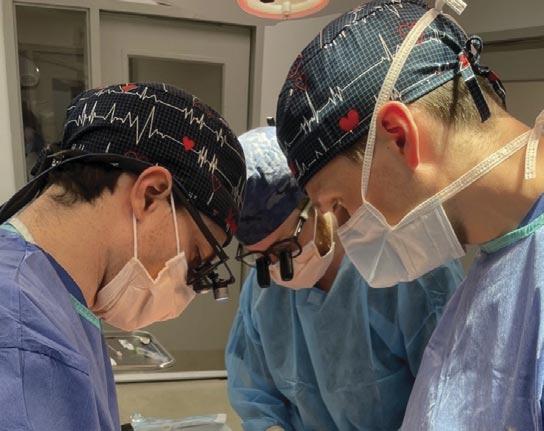
3 minute read
By John A. Treffalls, BS
First in Man Pig-to-Human Cardiac Xenotransplantation:
A Medical Student’s Perspective
Advertisement
By John A. Treffalls, BS
After completing the USMLE Step 1 exam at the end of my second year of medical school, I made a somewhat unorthodox decision to postpone my clinical clerkships at UT Health San Antonio to pursue a once-in-a-lifetime opportunity. I temporarily moved from San Antonio, Texas to Baltimore, Maryland to work in the University of Maryland Cardiac Xenotransplantation Laboratory under Directors Dr. Muhammed Mohiuddin and Dr. Bartley Griffith, both world-renowned for their contributions to the field of transplantation. I took this leap because, as an aspiring cardiothoracic surgeon, I was immensely fascinated with the work they were doing together and believed that it had the potential to one day save the lives of the tens of thousands of Americans on the transplant waiting list each year.
I quickly became immersed within the fast-paced lab that was doing what few in the world could safely accomplish. While there, I helped conduct pivotal research which involved transplantation of genetically engineered pig hearts into nonhuman primate recipients. The genetic modifications aimed to “humanize” the hearts, thereby improving the compatibility of the porcine organs with primate recipients and increasing their longevity once transplanted. Over many years, the experiments progressed from heterotopic transplantation (nonlife-supporting) to orthotopic (life-supporting), with survival times gradually increasing up to nine months postoperatively. Improved outcomes were due to advancements in the novel immunosuppression pioneered by Dr. Mohiuddin, use of non-ischemic graft preservation, improvements in postoperative care and an unrelenting drive to succeed by all members of the research team.
Decades of slow, incremental progress culminated on January 7, 2022, when David Bennett, a man repeatedly denied for cardiac allotransplantation and “stuck” on venoarterial extracorporeal membrane oxygenation (VA-ECMO) received a modified porcine heart identical to those that I helped transplant into baboons just a few months prior. While I had to return to San Antonio a few weeks earlier to start my clinical clerkships, I received real-time updates from the surgical residents who acted as my mentors, Dr. Corbin Goerlich, a general surgery resident at the Johns Hopkins Hospital and Dr. Aakash Shah, an integrated cardiothoracic surgery resident at the University of Maryland Medical Center.
Though we all hoped for the best and felt confident that it would work based on our previous research experience, no one truly knew what the outcome of the first-in-man surgery would be. The results were better than we could have hoped for. The surgery proceeded smoothly, the VA-ECMO was slowly weened over the subsequent postoperative days and Mr. Bennett began the long recovery process, like that of a typical cardiac transplantation recipient. However, at the time of this writing and more than two months since the landmark surgery, Mr. Bennett has unfortunately passed away. The entire xenotransplantation team at the University of Maryland is currently conducting a full investigation to determine the cause of his death.
Despite his death, this operation, made possible by the decades of tireless work preceding it, is truly paradigm-shifting for the field of organ transplantation. While much work remains to be done, xenotransplantation has the potential to provide an unlimited supply of donor organs for those suffering from end-stage organ failure. Without the perseverance of the research team and the incredible bravery of Mr. Bennett, this accomplishment would not have been possible. As a medical student at the very early stages of my training, I consider myself incredibly fortunate and truly humbled to have been able to contribute to it, no matter how small.
Figure 1. Research residents Corbin Goerlich, MD, Joshua Leibowitz, MD and John A. Treffalls, BS operating in the surgical suite of the University of Maryland Cardiac Xenotransplantation Laboratory in the months preceding Mr. Bennett’s pig-to-human operation.
John A. Treffalls, BS is a third-year medical student at the Long School of Medicine, University of Texas Health San Antonio. He is interested in pursuing a career in academic cardiac surgery and plans on applying to integrated thoracic surgery residency programs.












